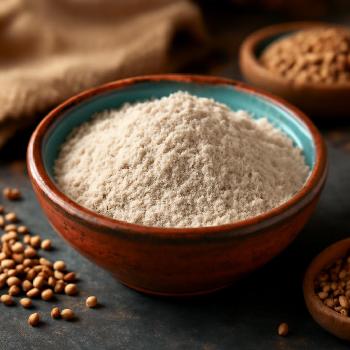Cooking Tips > Ingredients & Substitutes > Ingredient Clarifications > What is buckwheat flour?
What is buckwheat flour?
Buckwheat flour is a gluten-free alternative to wheat flour, known for its nutty flavor and nutritional benefits. It's a versatile ingredient that can be used in various recipes, from pancakes and crepes to noodles and breads.

Understanding Buckwheat
Despite its name, buckwheat is not related to wheat. It's a seed, making it naturally gluten-free and suitable for those with celiac disease or gluten sensitivity. The 'buck' refers to its resemblance to beech nuts, and 'wheat' refers to its use as a grain.
Production and Types
Buckwheat flour is made by grinding buckwheat groats (the hulled seeds of the buckwheat plant). There are two main types of buckwheat: common buckwheat and tartary buckwheat. Common buckwheat is more widely available and has a milder flavor. Tartary buckwheat has a more bitter taste. The color of the flour can vary depending on the milling process and the type of buckwheat used, ranging from light tan to dark brown.
Flavor Profile
Buckwheat flour has a distinctive earthy, nutty, and slightly bitter flavor. Some describe it as having a roasted or toasted flavor. This unique taste adds depth and complexity to baked goods and other dishes.
Culinary Uses
Buckwheat flour is a versatile ingredient that can be used in a variety of culinary applications:
Nutritional Benefits
Buckwheat flour is a nutritious food choice, offering several health benefits:
Working with Buckwheat Flour
Because buckwheat flour lacks gluten, it can be more challenging to work with than wheat flour. Here are some tips:
Substitutes for Buckwheat Flour
While the unique flavor of buckwheat flour is hard to perfectly replicate, here are some alternatives you can use, keeping in mind the need to adjust recipes for texture and binding:
FAQ
-
Is buckwheat flour gluten-free?
Yes, buckwheat flour is naturally gluten-free, making it a suitable option for people with celiac disease or gluten sensitivities.
-
Can I substitute buckwheat flour 1:1 for wheat flour?
No, because buckwheat flour lacks gluten, you cannot substitute it 1:1 for wheat flour in most recipes. It's best to use it in combination with other flours or binding agents.
-
How should I store buckwheat flour?
Store buckwheat flour in an airtight container in a cool, dark place. For longer storage, refrigerate or freeze it.
-
Does buckwheat flour have a strong flavor?
Yes, buckwheat flour has a distinctive earthy, nutty, and slightly bitter flavor that can add complexity to dishes.
-
What are some common uses for buckwheat flour?
Buckwheat flour is commonly used in pancakes, crepes, noodles (like soba), breads, muffins, and as a thickening agent in soups and sauces.
